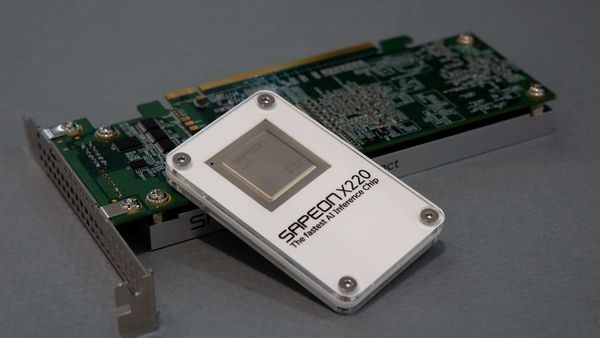EU weighs deal with TSMC, Samsung for semiconductor foundry


The European Union is considering building an advanced semiconductor factory in Europe in an attempt to avoid relying on the US and Asia for technology at the heart of some of its major industries.
The EU is exploring how to produce semiconductors with features smaller than 10 nanometers, and eventually down to 2 nanometer chips, according to people familiar with the project. The aim is to curtail dependence on countries such as Taiwan for chips to power 5G wireless systems, connected cars, high-performance computing, and more.
Also check these Vehicles
Taiwan Semiconductor Manufacturing Co. and Samsung Electronics Co. of South Korea, the two leaders making the most innovative processors in the sector, could be involved in the EU project, but nothing has been decided, a French Finance Ministry official said in a press briefing on Thursday, following the report from Bloomberg.
Also Read : GM posts higher profits, signals note of caution on chip shortage
The plans come at a time when automakers are grappling with semiconductor shortages. Europe’s biggest carmaker, Volkswagen AG, lost tens of thousands of cars in production, and Daimler AG has said it’s doing everything it can to minimize effects of the industrywide supply bottleneck. While the problem may prove to be short-lived, the issue has highlighted Europe’s reliance on sourcing key technology from abroad.
European attempts to ramp up production -- led in part by European Industry Commissioner Thierry Breton -- could involve re-developing an existing foundry or building a new one, the people said, who added no final decision has been taken and the time frame of the project is still to be determined.
A European Commission spokesperson did not respond to requests to comment. Samsung didn’t immediately respond to an email for comments.
“When it comes to fab location selection, we need to consider many factors including customers’ need. TSMC does not rule out any possibility, but there is no concrete plan at this time," spokeswoman Nina Kao said in an email when asked about cooperating with Europe.
Once a hub of semiconductor factories, Europe has dramatically cut back on manufacturing over the past 20 years, with automotive-chip designers including NXP Semiconductors NV and Infineon Technologies AG preferring to outsource a major chunk of production to giants like TSMC, and other foundries. When carmakers wanted to increase orders at the end of 2020, they struggled to secure capacity, after demand had already been allocated to other industries such as smartphones.
The EU outlined a goal last year to produce at least one-fifth of the world’s chips and microprocessors by value, without giving details on how this would be achieved. “Without an autonomous European capacity on microelectronics, there will be no European digital sovereignty," Breton said in a speech, adding that Europe currently accounts for less than 10% of global production of processors and other microelectronics.
To reach those goals, the European Commission, the bloc’s executive body, said it would launch a European alliance on microelectronics, which will likely include Europe’s major chipmakers and possibly also carmakers and telecom companies. Technical work is ongoing to map out a plan for the alliance, but initial discussions about the fabrication plans have already taken place, according to people familiar with the matter. The alliance is due to be formally unveiled at the end of the first quarter of the year.
Europe’s plans to reinvest in leading-edge chip fabrication may be too little, too late as China, Japan and the US all try to increase or regain their self-sufficiency in semiconductors. But all are slipping further behind industry leaders Samsung and especially TSMC, which announced capital spending of as much as $28 billion for this year.
The industry has also spent decades crafting a well-oiled global supply chain that would be difficult to change overnight, according to Peter Wennink, chief executive officer of ASML Holding NV of the Netherlands, which has an effective monopoly on the machines needed to fabricate the best chips. Regions will have to rebuild a local ecosystem, which in turn would likely raise costs.
“If you think that you can actually replicate that within a very short term, it’s simply not possible," Wennink said at ASML’s full-year earnings press conference in January. “If governments are determined to do this, it will take years to break this up, and not months."
In Europe, some semiconductor companies have questioned the EU’s plans to make 2 nm chips, which aim to challenge industry leaders Samsung and TSMC. The Asian companies, whose current leading-edge chips are 5 nm, both have plans to go down to the even more advanced 3nm.
Automakers traditionally use relatively basic chips, but as cars made by Tesla Inc. and VW have become increasingly reliant on software, the demand for smaller semiconductors has increased. GlobalFoundries is Europe’s main foundry, which typically produces 28 nm processors at its Dresden factory for mainstream applications.
“In terms of geo-strategy and from a resilience perspective in the international system, it would make a lot of sense to have an advanced foundry" in Europe, said Mathieu Duchatel, who heads the Asia program at the Institut Montaigne, adding that while there may currently not yet be a need for 5 nm chips in Europe, decades in the future it could be of use, particularly in defense innovation.
One of the biggest hurdles for the EU’s semiconductor plans could come down to financing. At a conference last week, French Finance Minister Bruno LeMaire said Europe’s industrial projects, including on semiconductors, are all very investment intensive. “One of the weak points is the access to risk capital in Europe and the implementation of the capital market in Europe," he said.
Breton said last year the chip alliance would be armed with an initial combined public and private investment of as much as 30 billion euros, only slightly higher than TSMC’s annual capital expenditure this year. Around 19 member states have already backed the commission’s plans and have agreed to establish an investment instrument co-financed by the countries and participating companies. At least 20% of the EU’s 672.5 billion-euro recovery fund has also been allocated for digital priorities, including microelectronics.








 40 kWh
40 kWh 150 Km
150 Km



 998 cc
998 cc Petrol
Petrol














